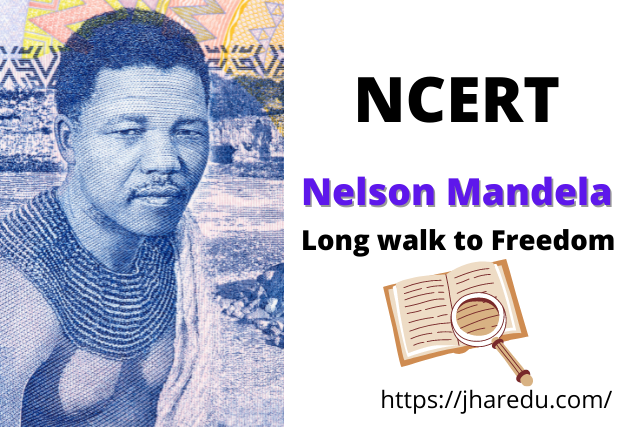Nelson Mandela: Long Walk to Freedom class 10 short summary with Important Questions Answers. This article is very useful for the students of class 10.
Nelson Mandela: Long Walk to Freedom Summary.
Nelson Mandela’s “Long Time for Freedom” is about South Africa’s struggle for freedom. On May 10, 1994, Nelson Mandela was sworn in as South Africa’s first black president. So it became a newborn democracy. Nelson Mandela took the oath of office as the first black president.
Many dignitaries from different countries were already part of the most important day. In his speech Mandela thanked all those dignitaries. Mandela assured his people that his country would never face the same oppression of one another. Democracy had been established in South Africa and as a result, a non-racial government was established.
South Africans sing two National Anthems as a symbol of the day. Mandela recalled that the reason for the movement was that black people were being exploited by whites. He said this form of oppression of the South African people was the origin of many stars. People must learn to hate first, because if they hate they can be taught to love, as love comes from the opposite. He also says that a brave man is not afraid but he overcomes.
In life, a man has two major responsibilities. Firstly by his family, his parents, his wife and children and secondly by his responsibility towards his country, people and society. Everyone is doing their job according to their own inclinations and interests. But it was very difficult to achieve in a country like South Africa. When Mandela grew up he realized that his freedom was a mere figment of his imagination. In fact, he was a slave to exploitation. He also understood that he was not only a slave but also a member of his own family.
According to him, freedom is also compulsory for those who have oppressed others in the past. They also have the right to have it because the one who snatches the freedom of another is the same prisoner. Therefore, the oppressor is the same prisoner as the oppressed. The oppressor is also not free.
Nelson Mandela: Important Questions Answers.
1. Where do celebrations take place? Can you name any public buildings in India made of sandstone?
A. The celebrations took place in a theater built by the Union Buildings in Pretoria. In India, we have several public buildings made of sandstone, some of which are Rashtrapati Bhavan, Red Fort and the Supreme Court of India in New Delhi.
2. Can you say how the 10th of May is ‘autumn day’ in South Africa?
A. Since South Africa lies in the Southern Hemisphere, we can say that May falls in the fall.
3. At the beginning of his speech, Mandela talks about the “extraordinary human tragedy”. What do you mean by that? What is “the glory, the glory, the success” of the individual?
A. “On a rare human tragedy”, Mandela refers to the apartheid system that was rampant in South Africa under the previous leadership. People of color were treated unfairly and no one deserved it. He resisted wrong practices and eventually won a democratic election to become South Africa’s first black President. He refers to this victory as “glorious human achievement”.
4. What does Mandela thank the international leaders for?
A. The author thanked the international leaders for their cooperation and support in their pursuit of freedom, justice and human dignity. In the past, many countries have severed ties with South Africa because of their apartheid practices.
5. What principles does he set for the future of South Africa?
A. As the newly elected President of South Africa, Nelson Mandela sought to liberate the country from all injustices. He set goals for a world free of poverty, prejudice, and injustice.
6. What do military generals do? How has their attitude changed, and why?
A. Military generals greet Nelson Mandela and pledge their support for South Africa’s newly established democratic government. Their attitude has changed because they were previously under white rule. By that law, they were going to arrest Mandela as he was considered a criminal. Now, with the end of apartheid and the formation of a democratic government, their attitudes have changed.
7. How did Mandela’s understanding of freedom change with age and experience?
Ans. As a young boy, and a student, Mandela’s idea of freedom was to be able to sit outside at night, read whatever he wanted and go wherever he wanted. Growing up as a man, he realized that these were “temporary freedoms” that he had hoped for because their “basic freedoms” had been taken away. There was no freedom to have a peaceful marriage, family, and life. Black people are deprived of their basic rights. To them, freedom was a “delusion”.
8. How did Mandela’s ‘hunger for freedom’ change his life?
Ans. When Mandela realized his hunger for freedom, his life changed forever. It turned him into a family man and a homemaker and a nervous young man. He built his whole life by fighting for the basic rights of his community. He was more unselfish and more righteous than before.


1 thought on “Class 10 English Chapter 2: Nelson Mandela”